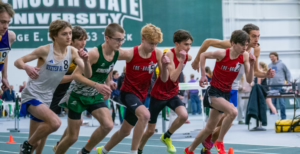“Limits, like barriers, exist only in theory. There must be some limits to human performance, logic insists, but no one knows where they are, and records keep falling.” ~ Jeff Johnson
By John Goegel
Throughout the history of mankind, there are innumerable examples of men and women testing the limits of human endurance. My friend, Brian, and I converse regularly by phone and the topic of discussion always comes around to the world of track & field. As a result of an innocent question of his nurse (a recent emigre of the Czech Republic), ” Do you know of Emil Zatopek?”, and the rumor that Jakob Ingebrigtsen has approached the IOC about a possible 800m-1500m-5000m or 1500m-5000m-10000m triple at the 2024 Paris Olympics, our recent daily conversations have explored elite athletes racing multiple events at the highest level of competition. 
Emil Zatopek, nicknamed the “Czech Locomotive”, won gold medals in the 5000m (14:26.0q, 14:06.0f), 10000m (29:17.0) and marathon (2:23:20) events at the 1952 Helsinki Olympics – four races (64,200m of racing) over eight days. His final medal came when he decided at the last minute to compete in the first marathon of his life. His strategy for the marathon was simple: he would race along Jim Peters, the British world-record holder. After a punishing first fifteen kilometres, in which Peters knew he had overextended himself, Zátopek asked the Englishman what he thought of the pace. To attempt to psych out the Czech, Peters replied that it was too slow. At that point Zátopek simply accelerated. Peters did not finish, while Zátopek went on to set an Olympic record. Emil Zatopek is the only athlete to win the Olympic “triple”. Though his athletic accomplishments are herculean, Emil Zatopek was also highly regarded by his country(wo)men as a political activist.
In the 1968 Mexico City Olympics (held at an oxygen-deprived altitude of 7349′), Kenya’s Kipchoge Keino attempted a different triple – 10000m, 5000m, 1500m – 6 races (23,700m of racing) over 8 days. In the first race, he collapsed onto the infield with two laps to go in the 10000m with severe abdominal pain (later diagnosed as a gall bladder problem). Ignoring the advice of his doctors to withdraw from further competition, two days later he qualified (14:28.4) for the 5000 final (14:05.2) where he placed second by 0.2  seconds to Tunisian Mohammed Gammoudi. In the next three days, Keino advanced through two qualifying rounds (3:46.96q, 3:51.50sf) to win the 1500m final over American Jim Ryun in an Olympic Record of 3:34.91. [More recent Olympics schedule the three 1500m races over four days.]
seconds to Tunisian Mohammed Gammoudi. In the next three days, Keino advanced through two qualifying rounds (3:46.96q, 3:51.50sf) to win the 1500m final over American Jim Ryun in an Olympic Record of 3:34.91. [More recent Olympics schedule the three 1500m races over four days.]
At the 1976 Montreal Olympics Finland’s Lasse Virén repeated (as in the 1972 Munich Olympics) as the 5000m (13:33.39q, 13:24.76f) and 10000m (28:14.95q, 27:40.38f)) gold medalist, referred to as the “double double” In 1976 eighteen hours after the 5000m final, Viren competed in the men’s marathon, his first, and finished fifth in 2:13:11 – five races (72,200m of racing) in nine days. [More recent Olympics have not scheduled a qualifying round in the 10000m event.]
What are the origins of such audacity? A Mike Smith NHTF article (https://newhampshiretrackandfield.com/what-we-do-at-least-one-big-thing/) describes the “challenge” of racing the four longest track events in a single high school meet. I had the opportunity to witness two young men compete at those distances in state division championship competition, all with the goal of helping their respective teams win a team title, In 2005 senior Brendan Collins (Belmont HS) raced 4:26.49 (school record) (2nd place), 2:03.43 (1st place), 10:34.60 (5th place) and a 53.9 split on a 2nd place 4×400 team. In 2022 junior Patrick Gandini (Gilford HS) raced 4:26.75 (1st place), 1:57.15 (school record) (1st place), 9:51.11 (1st place) and a 53.7 split on a 2nd place 4x400m team. Both Belmont HS and Gilford HS were able to secure runner-up division team titles.
respective teams win a team title, In 2005 senior Brendan Collins (Belmont HS) raced 4:26.49 (school record) (2nd place), 2:03.43 (1st place), 10:34.60 (5th place) and a 53.9 split on a 2nd place 4×400 team. In 2022 junior Patrick Gandini (Gilford HS) raced 4:26.75 (1st place), 1:57.15 (school record) (1st place), 9:51.11 (1st place) and a 53.7 split on a 2nd place 4x400m team. Both Belmont HS and Gilford HS were able to secure runner-up division team titles.
Brian, my friend for more years than we can count on all our fingers and toes, is presently engaged in the challenge of his life, more demanding than all the 25 plus Boston Marathons he has competed in…combined. He is battling brain cancer. The work ethic, discipline, commitment and dedication he has exhibited within his many annual training cycles will be called upon as he faces this ultimate struggle.











